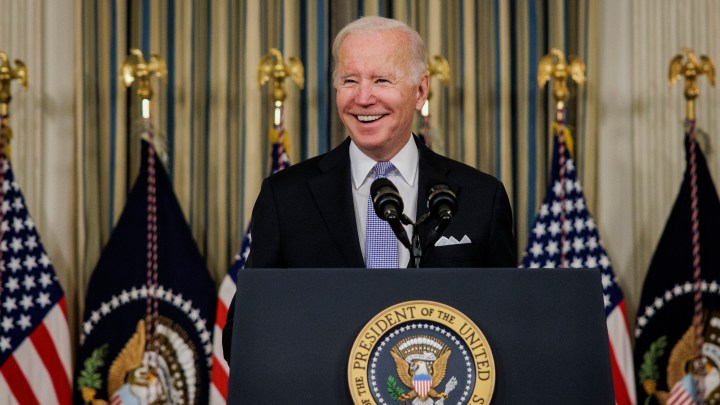
So what exactly is in the infrastructure bill?

There is an awful lot of stuff packed into that $1 trillion infrastructure bill Congress sent to the president this weekend: big projects to fix roads and bridges, broadband, and even the kitchen sink — or at least the water flowing into it.
But, OK, what exactly is in this thing? And how exactly does it address the biggest challenges facing this economy?
The climate crisis
This infrastructure bill got a lot of hype. There’s a reason for that, said Adie Tomer, who leads the Metropolitan Infrastructure Initiative at the Brookings Institution.
“The spending in this package alone is going to rival the infrastructure programs within the New Deal,” he said.
Much of that spending is pointed at reducing greenhouse gas emissions, including a record $89.9 billion in funding for public transportation.
“So we can expect to see smoother travel along older rail lines, station modernization and new buses all across the country,” Tomer said.
There’s also billion-dollar investments in electric vehicle charging stations and making the power grid more efficient.
Still, Tomer said this money is just a down payment. The other infrastructure bill — the one that hasn’t passed yet — is a bigger deal for the planet, he said.
Supply chains
The Infrastructure Investment and Jobs Act also deals with something we’ve been reporting on … and dealing with personally: those darn supply chains.
The infrastructure bill provides a 40% funding boost to projects that will separate freight trains from highways and other roads “so that cars and trucks and emergency vehicles, etc., do not have to stop,” said Elaine Nessle, executive director of the Coalition for America’s Gateways and Trade Corridors.
Beyond that change saving drivers’ sanity, the trains won’t have to slow down so much when traveling through cities, she said.
“Anytime that you see fresh flowers in the winter, a lot of times those are coming via air freight,” Nessle added.
Helpful, given that Valentine’s Day is just around the corner.
Marginalized communities
You’d forgive certain communities for being skeptical of this infrastructure bill. The last century saw entire neighborhoods — often Black and brown — devastated and divided all in the name of new freeways and highways.
Now, there’s roughly $1 billion in the bill for the Reconnecting Communities Initiative.
“The idea here is to prioritize the movement of people versus the movement of cars and to really connect communities that were once connected until the freeway came,” said Alvaro Sanchez with the Greenlining Institute.
Think turning that freeway into a pedestrian-friendly boulevard. Still, a billion dollars is far less than the $20 billion initially proposed.
The bill does put an unprecedented $65 billion toward narrowing the digital divide. “I think we saw during the pandemic how vital of a service broadband access is to everyone,” Sanchez said.
That’s especially true for lower-income and marginalized communities.
There’s a lot happening in the world. Through it all, Marketplace is here for you.
You rely on Marketplace to break down the world’s events and tell you how it affects you in a fact-based, approachable way. We rely on your financial support to keep making that possible.
Your donation today powers the independent journalism that you rely on. For just $5/month, you can help sustain Marketplace so we can keep reporting on the things that matter to you.

















